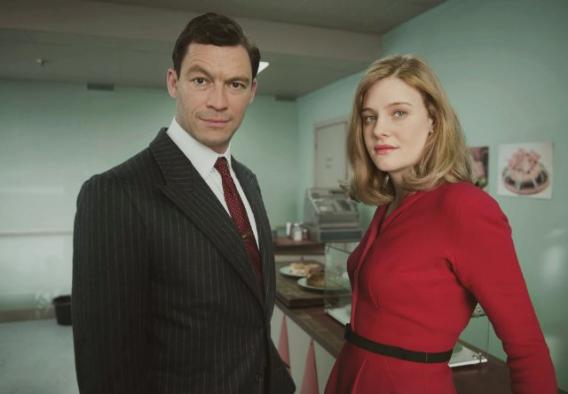There’s an interesting meta-story at the center of The Hour, the British drama that returns to BBC America for its second season tonight. The news program that launched in the show’s first season is now going through a tricky phase. “The last six months have been an exercise in maintaining the direction and morale of The Hour,” says Randall Brown, the BBC’s new head of news, played with a galvanizing scowl by The Thick of It’s Peter Capaldi. Brown’s job is to buck up the team—to stop philandering anchor Hector Madden (Dominic West) from squandering his talent and to keep producer Bel Rowley (Romola Garai) from working herself to death (or, worse, to boredom and misery). Abi Morgan, creator of the BBC drama—she’s also written plays and films, including The Iron Lady and Shame—faces a similar task: to reinvigorate the show and to convince viewers (some of whom surely shared my opinion that the first series was full of fascinating characters doing very dull things) to give it another chance. (Alyssa Rosenberg has a great interview with Morgan over at DoubleX.)
Morgan succeeds, for the most part, by dialing down the crazy conspiracies that dragged Season 1 into the weeds. The show-within-the-show again tackles big social and cultural themes—why else set the show in 1957—but this time around Morgan seems to realize that what we are really interested in is the cast of characters: Bel, Hector, and quixotic newsman Freddie Lyon (Ben Whishaw), who has developed a new maturity and self-confidence after a stop in the New World.
Even so, the historical plot points too often take center stage, and it takes a writer with more subtlety than Morgan to make them seem fresh. I’ve seen just two episodes of Season 2, but suspect I could predict with roughly 85-percent accuracy what will happen in the plots involving Soho vice and the racist response to African and Caribbean immigrants arriving in working-class London neighborhoods.
(The Brits seem to be running out of mid-century historical themes, perhaps because they make so many period shows. The recent Upstairs Downstairs remake also dallied among Oswald Mosley’s fascist thugs, and it’s surely just a matter of time before one of the residents of Downton Abbey dons a brown shirt. Meanwhile, BBC America’s underappreciated Whitechapel took on Soho prostitution and porn.)
The characters do play beautifully together, though, and the simmering sexuality that Brits do so well is ridiculously hot—pretty much every character fancies someone they shouldn’t or has had a torrid affair at some point in the recent past. The Hour does a wonderful job of showing that even before HR departments started conducting training courses about sexual harassment, everyone knew that interoffice romances were a bad idea.
And with the addition of Peter Capaldi, there’s now no doubt that the backstage drama is infinitely more interesting than anything else in the show. Anyone who thought Capaldi was defined by Malcolm Tucker’s shouting in The Thick of It will be surprised by his quiet, reflective portrayal of Randall Brown. Whereas Tucker motivated his political shock troops by bullying and foul-mouthed intimidation, Brown uses artfully deployed silences to get the best from the news staff.
As it happens, the BBC is going through its own serious travails at the moment. Budget cuts have sapped employee morale, the Jimmy Savile story was broken on a rival network, a factual error on a news show led to the director-general’s resignation—and these tribulations all echo story lines from The Hour. Television production itself has all the ingredients for fascinating stories, and The Hour needn’t rely on world-political events to provide drama. If only the show’s producers had more faith in their characters—and in the idea that viewers will be entertained and challenged by watching them struggle to do a good job of holding people out there in the “real world” accountable for their actions.
